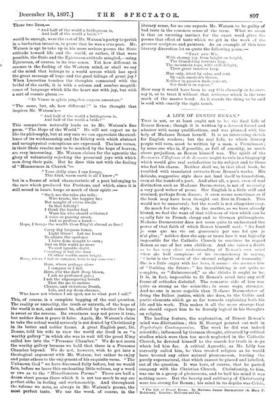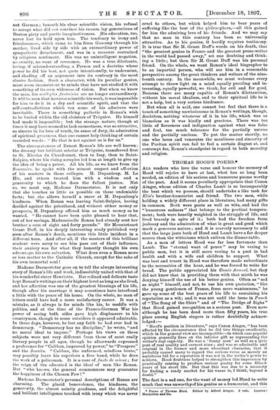A LIFE OF ERNEST RENAN.*
THIS is not, or at least ought not to be, the final Life of Ernest Renan ; though it is written by a devoted friend and admirer with many qualifications, and was planned with the help of Madame Renan herself. It is an interesting sketch for English readers ; but the real Life, to which literary people will turn, must be written by a man, a Frenchman ; by some one who is, if possible, as full of amenity, as much above prejudices, as Renan himself was. The spirit of the Souvenirs d'Enfance et de Teunesse ought to rule in a biography which would give real satisfaction to its subject and to those who feel his charm. Neither shall we, in that ideal book, be troubled with translated extracts from Renan's works. His delicate, suggestive style does not lend itself to translation, even at the hands of a poet. And after all, a poet, even of real distinction such as Madame Darmesteter, is not of necessity a very good writer of prose. Her English is a little stiff and strained, perhaps from disuse; it even seems sometimes as if the book may have been thought out first in French. This would not be unnatural ; but the result is not altogether easy.
So much for the style; in the matter, as we have already hinted, we feel the want of that wideness of view which can be eq.ially fair to French clergy and to German philosophers. Madame Darmesteter does not seem quite to understand the power of that faith of which Renan himself said: "Au fond je sena qne ma vie eat gouvermle par line foi qua je n'ai plus ; " neither does she appear to see how it was logically impossible for the Catholic Church to continue to regard Renan as one of her own children. And he raises a doubt as to her very clear understanding of Renan's own mind when she half complains of his inconsistency in saying, -` Christ is the Creator of the eternal religion of humanity." She is a little angry with her hero, it seems ; she accuses him of "limiting the future;" his free-thinking is not quite so complete, so "disinterested," as she thinks it ought to be. It is, in fact, impossible to fit Renan's mind into any stiff frame of orthodox disbelief. The romantic side of him was quite as strong as the scientific ; in some ways, stronger. And no one is more capable than Madame Darmesteter of doing the fullest justice, which she does, to the Celtic and poetic elements which go so far towards explaining both his life and his work. This makes it all the more strange that she should expect him to be fiercely logical in his thoughts on religion.
The leading feature, the explanation, of Ernest Renan's mind was dilettantism ; this M. Bourget pointed out well in Psychologie Contemporaine. The work he did was indeed scientific ; influenced by German thought, attracted by critical studies which were then too much neglected in the Catholic Church, he devoted himself to the search for troth in ways which led him far. A critical Agnostic, as Mr. Lilly has correctly called him, he thus treated religion as he would have treated any other natural phenomenon, leaving the purely supernatural, that which cannot be placed and labelled, out of the question. It was here, of course, that he parted company with the Christian Church. Christianity, to him, was one in a group of phenomena, and to half his mind it was nothing more. But the beauty and sublimity of Christianity were too strong for Renan ; his mind in its depths was Celtic, • The Life of Ernest Renan. By Madame James Darmesteter (A.. Mary T. Robinson). London: Methuen and Co.
not German ; beneath his clear scientific vision, his refusal to accept what did not convince his reason, lay generations of Breton piety and poetic imaginativeness. His education, too, never lost its hold upon him. The tendency to irony and frivolousness, which came to him from Gascony through his mother, lived side by side with an extraordinary power of sympathetic detachment, and was in a measure restrained by religions sentiment His was no unintelligent negation, no enmity, no want of reverence. He was a true dilettante, loving, if misunderstanding, a Person and a doctrine whose power he did his best, not quite intentionally, to undermine, and shading off an argument into its contrary in the most elusive fashion. Such a character, with its peculiar genius, must seem inconsistent to minds that have not studied it with something of its own wideness of vision. But when we know the man, his multiples fantaisies are no longer extraordinary. It will be seen that however scientific his work, it was impossible for him to do it in a dry and scientific spirit, and that the self-contradictions which vex some of his admirers were inevitable. There is something pathetic in Renan's wish to be buried within the old cloisters of Treguier. He himself had made it impossible ; but the strange nature, though at times it may have seemed to lack earnestness, was so attractive, so sincere in its love of truth, its sense of duty, its admiration of spiritual greatness, that one cannot help thinking of certain recorded words : "He that is not against us is for us."
The circumstances of Ernest Renan's life are well known : the dreamy but brilliant scholar at Tregnier, transferred first to St. Nicolas du Chardonnet, then to Issy, then to Saint- Sulpice, where his rising scruples led him at length to give up the idea of being a priest. All his life, as we know from the Souvenirs, he spoke with the utmost respect and affection of his masters in these colleges. M. Dupanloup, M. Le Hir, and others treated him with a wisdom and a generosity to which he does the fullest justice. Not so, we must say, Madame Darmesteter. It is not only that she touches as little as possible on these undeniable facts; but she allows herself a sneer at M. Dupanloup's kindness. When Renan was leaving Saint-Snlpice, having decided against the priesthood, and without either money or prospects, M. Dupanloup offered him as much money as he wanted. "He cannot have been quite pleased to hear that, out of her savings, Mademoiselle Renan had already sent her brother a sum of eight and forty pounds." Sir Mountstuart Grant Duff, in his deeply interesting study published very soon after Renan's death, mentions this little incident in a different tone. And after all, if the masters of this brilliant student were sorry to see him pass out of their influence, their anxiety was for what they honestly thought his own advantage, his own salvation. What does even a Renan more or less matter to the Catholic Church, except for the sake of his own immortal soul !
Madame Darmesteter goes on to tell the always interesting story of Renan's life and work, indissolubly united with that of his wonderful sister Henriette. Her refined and delicate taste kept Renan's writings on their highest level as long as she lived, and her affection was one of the greatest blessings of his life, though after his marriage it may sometimes have interfered a little with the peace of his home. On the whole, no man of letters could have had a more satisfactory career. It was a mistake, as it always is for minds like his, to meddle with politics, and at the time of the Franco-German War his power of seeing both sides gave high displeasure to his countrymen, though to some outsiders it appeared admirable. In those days, however, he lost any faith he had ever had in democracy. "Democracy has no discipline," he wrote, "and no moral ideal to impose." Perhaps his views on these subjects were not very different from those of most really literary people in all ages, though he afterwards expressed a preference for "Caliban, improved by power," to "Prospero" and the Jesuits. " Caliban, the unformed, mindless brute," may possibly leave his superiors a free hand, while he does the work of a policeman. It is a. case of faute de mieuz ; for the reign of the educated is the ideal of men like Renan. But "who knows, the general commonness may guarantee the happiness of the Chosen Few !"
Madame Darmesteter's personal descriptions of Renan are charming. The placid benevolence, the kindness, the generosity, the almost saintly goodness, and the delightful and brilliant intelligence touched with irony which was never cruel to others, but which helped him to bear years of suffering like the best of the philosophers,—all this gained for him the admiring love of his friends. And we may say that no man in this century has been so universally attractive. As to his genius, it hardly requires testimony. It is true that Sir M. Grant Duff's words on his death, that "the greatest genius in France and the greatest prose-writer in the world had passed away," set one doubting and think. ing a little ; but then Sir M. Grant Duff was his personal friend. On the whole, we want Renan's ideal biographer to be an impartial person, who will see him in a reasonable perspective among the great thinkers and writers of the nine- teenth century. In the meanwhile, we must welcome every attempt to throw light on a mind equally puzzling and in- teresting, equally powerful, we think, for evil and for good. Because there are many capable of Renan's dilettantism, without his moral idealism, and to their spiritual life he is not a help, but a very serious hindrance.
But when all is said, one cannot but feel that there is a touch of something unwholesome in Renan's writings, though, doubtless, nothing whatever of it in his life, which was as blameless as it was kindly and gracious. There was too little of fierceness and indignation against what was false and foul, too much tolerance for the partially untrue and the partially unclean. To put the matter shortly, no one who loves and venerates the manliness and sincerity of the Puritan spirit can fail to feel a certain disgust at, and contempt for, Renan's standpoint in regard to both morality and religion.







































 Previous page
Previous page